www.thornwalker.com/ditch/devlin_home_ec_05.htm
© 2008 F. Roger Devlin. This page © 2008
WTM Enterprises.
All rights reserved.
Home economics
V
Natural erosion of male role under modern conditions;
deliberate erosion of male role by feminism
By F. ROGER
DEVLIN
| If you
find this article to be of interest, please send a donation of $3 to TLD. More
information appears below.
|
9.
Obviously the restoration of the marriage covenant is a necessary condition
for the restoration of the family and any sustainable civilization. But is it
also sufficient? Many female commentators assume so. This, I believe, is
because women are naturally programmed to play what Michelle Langley, in her book Women's Infidelity, calls
"the commitment game." They naturally see "getting him
to marry me" as the entire goal of dating and courtship. Accordingly, they
focus on their dissatisfaction as the cohabiting girlfriend, and call
marriage a "simple solution" to the problem.
I disagree. The rate of female-initiated divorce is conclusive proof that
dragging or driving the selfish bastards to the altar is not going to solve
anything. As men vainly try to explain to their girlfriends, a marriage
ceremony in and of itself changes nothing, and certainly does not cause
anyone to "live happily ever after." Today, in fact, much of the same
confusion and aimlessness observable on the dating scene is found in family
life itself. The deeper problem, as I see it, is an atrophy of
function.
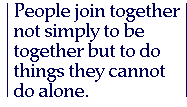 People join together not simply to be together but to do things they cannot
do alone. Traditionally,
they have formed families to carry out the essential function of childrearing
— along with various economic tasks subordinate to that end, and some
secondary functions such as care of the elderly. Conversely, to remain strong,
the family must retain some of those functions. Today, however, a father's
upper-body strength is no longer needed to provide for children; his personal
courage is seldom called upon to protect them. A mother can get clothing and
even prepared food from stores more easily than produce those things at home. In
other words, the domestic economy has been "outsourced."
People join together not simply to be together but to do things they cannot
do alone. Traditionally,
they have formed families to carry out the essential function of childrearing
— along with various economic tasks subordinate to that end, and some
secondary functions such as care of the elderly. Conversely, to remain strong,
the family must retain some of those functions. Today, however, a father's
upper-body strength is no longer needed to provide for children; his personal
courage is seldom called upon to protect them. A mother can get clothing and
even prepared food from stores more easily than produce those things at home. In
other words, the domestic economy has been "outsourced."
As its economic functions wither, the family's sense of community fades:
homes turn into warehouses for corporate "human resources" (telling phrase!)
and nurseries for public school system fodder. The ancestral hearth becomes
a suburban tract house, a site for eating, sleeping, and — decreasingly
— procreation. These in turn lose their human (and, indeed,
sacramental) significance and become merely animal functions. Leisure
activity is replaced by the passivity of diversions such as television
or music-listening that involve no interaction between family members.
Child psychologists distinguish a phase of "parallel play" before children
discover that cooperation will enable them to do more interesting things: our
families might be seen as reverting to the parallel-play stage.
These developments are economic in the most proper sense of the term, for
the family is still a more fundamental economic fact than the market where
goods and services are exchanged. Most professional economists, however,
find no place in their thoughts for procreation, or even for sexual
dimorphism. And I do not believe that results from the direct influence of
anti-natalist or feminist ideology, in which most of them take no interest. It
is rather that the home has simply fallen out of the economist's purview.
For example, economists have produced cogent refutations of the feminist
"57 cents on the dollar" canard, critiques of "comparable worth," "affirmative
action," and so on. But they usually limit themselves to pointing out why men
are more productive, i.e., why men's labor commands a higher price on the
market than women's. They seem to accept the premise that women and men
are interchangeable agents of production whose efficiency can be
arithmetically assessed; they ignore qualitative social-role differentiation.
That tends not only to undermine the dignity of the traditional female role of
wife and mother, as gallant conservatives have long pointed out, but also the
specifically male breadwinning role. For men are not simply more
productive than women (although they are that as well); rather, they have a
natural provider role with social and familial meaning.
The economy is not Wall Street; it is Dad dragging himself out of bed at six
o'clock in the morning to go to an unglamorous job because he loves his
children. It is a remarkable psychological fact that most men find
satisfaction in providing for their families. They certainly do not take much
satisfaction in paying income tax or meeting car payments. Children are
frequently more expensive than taxes or cars, but most fathers take well to
the provider role. Family life transforms what might otherwise be mere
drudgery into a vocation; the father's work acquires a significance it cannot
have for a bachelor. Is there not something missing from a science of
economics that has no use for this fact?
It is, therefore, an insufficient response to the feminist slogan of equal pay
for equal work to show that women are not doing equal work. We will
eventually have to rediscover the forgotten concept of the "family income"
— not only because men usually happen to be better providers than
women, but also because the male role is vulnerable in the modern world, and
must be shored up for the family to function properly.
The contemporary workplace is inherently unfavorable to men for a number of
reasons unrelated to the direct influence of feminism. While classical
capitalism of the sort celebrated by the followers of Adam Smith or Ludwig
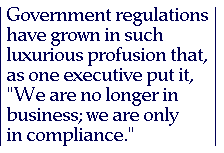 von Mises may not quite have been the Wild West, it did allow
significant scope for such male traits as competitiveness, risk-taking,
leadership, enterprise, and initiative. In a postindustrial
bureaucratic corporation there is little room for any of these. The same
psychological traits that once made women better at knitting than men, viz.,
a high degree of tolerance for routine and repetition, today give them an edge
in common forms of employment such as word processing and data entry.
von Mises may not quite have been the Wild West, it did allow
significant scope for such male traits as competitiveness, risk-taking,
leadership, enterprise, and initiative. In a postindustrial
bureaucratic corporation there is little room for any of these. The same
psychological traits that once made women better at knitting than men, viz.,
a high degree of tolerance for routine and repetition, today give them an edge
in common forms of employment such as word processing and data entry.
Similarly, the superior social skills that once fitted women to be hostesses
now give them an advantage in the expanding customer-service sector of the
economy.
Modern machines have lowered the economic value of upper-body strength
while increasing that of multi-tasking skills. Women are natural multi-taskers. That is an evolutionary adaptation to the requirements of
motherhood, well characterized by antifeminist Carolyn Graglia as a
"cheerful responsiveness to constant interruptions." If the male inventors of
our labor-saving office devices had known what trouble they were preparing
for their grandsons, they might have become Luddites.
Government regulations have grown in such luxurious profusion that, as one
executive put it, "We are no longer in business; we are only in compliance." Women are better suited than men to fastidious compliance with bureaucratic directives and regulatory
minutiæ. They
are usually untroubled by the enforced niceness of Political Correctness,
such as governmental sanctions against anyone who forgets to call cripples
"the differently abled."
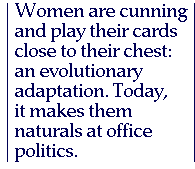 The contemporary white-collar employee is dependent upon a boss for his
livelihood, and must therefore be deferential, diplomatic, and often less than
forthright about what he thinks. It is not hard to see which sex is better at
this sort of behavior. Women are cunning and play their cards close to
their chest: an evolutionary adaptation left over from the days when their
survival and reproductive success depended on an ability to manipulate males
physically stronger than themselves. Today, it makes them naturals at office
politics.
The contemporary white-collar employee is dependent upon a boss for his
livelihood, and must therefore be deferential, diplomatic, and often less than
forthright about what he thinks. It is not hard to see which sex is better at
this sort of behavior. Women are cunning and play their cards close to
their chest: an evolutionary adaptation left over from the days when their
survival and reproductive success depended on an ability to manipulate males
physically stronger than themselves. Today, it makes them naturals at office
politics.
Most men find the atmosphere of the modern workplace stifling
and tedious, and women themselves are seldom attracted to the sort of
docile, gelded drudges that manage to succeed in it. But men cannot find
refuge at home either, because the women who might have made homes for
them are out competing against them in the activities of the broader
society.
10.
To these intrinsic male disadvantages in the
modern workplace must be added those directly
created by feminism.
British philosopher C.E.M. Joad once characterized
cultural decadence as "a sign of man's tendency to
misread his position in the universe, to take a view
of his status and prospects more exalted than the
facts warrant and to conduct
his societies and to plan his future on the basis of
this misreading." [14] Feminism might usefully be viewed in this light
as the decadence of European womanhood. It can
only have been such a delusion of grandeur that led
women with no experience of the world of industry
to assert their "right" to a career —
meaning, really, an easy and successful career.
They pictured themselves, feet up on mahogany
desks, barking orders at cringing male
subordinates, and getting rewarded for it with fat
paychecks and prestige.
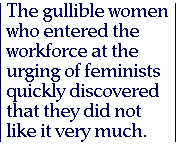 The practical result of loudly proclaiming that
careers will be opened to talents, as
students of the "civil rights" movement know, is
that vast hordes of formerly contented
mediocrities start thinking of themselves as
talented. When they fail at their endeavors, they
feel cheated, assume someone else must be to
blame, and call for punishment.
The practical result of loudly proclaiming that
careers will be opened to talents, as
students of the "civil rights" movement know, is
that vast hordes of formerly contented
mediocrities start thinking of themselves as
talented. When they fail at their endeavors, they
feel cheated, assume someone else must be to
blame, and call for punishment.
The gullible women who entered the workforce at
the urging of feminists quickly discovered that
they did not like it very much (despite their
feminine advantages enumerated above). Work
turned out to be ... well, a lot of work. Their
response to the broken promises of feminism,
however, was not to blame the ideologues for
having made them or themselves for having
believed them; it was to blame men. Men simply
had to re-engineer the world of work until women
found it "fulfilling." And feminism would lead the
way again. (One of the movement's greatest
strengths has been this ability to profit politically
from its own failures.)
It would be difficult to calculate the number of
laws and regulations promulgated in the last three
decades with a view to the convenience of working
women. And, although feminists have formulated
the proposals, it is largely men who have
implemented and enforced them — serenely
confident, no doubt, that the new rules could only
be used against bad men. But I am afraid
women are no exception to the rule that power
corrupts, and few of them hesitate to convert the
novel legal protections into weapons the moment
they sense it might be to their personal
advantage.
At my own place of work there are posters
prominently displayed to inform women of a toll-free number they can call if they dislike anything a
male coworker does or says. There is no
equivalent number for men, obviously; but even if
there were, it is not hard to see which sex is more
given to complaining. Other posters warn men
against making any criticism, even casually and
informally, of a woman's job performance.
Everyone knows what is going on, but no one says
anything. The women have all read the stories
about $6 million harassment
settlements, and figure it beats working for $17
an hour. Their eyes are peeled for opportunities.
The average corporate manager will unhesitatingly
betray a fellow male employee (and smugly pose as
a defender of wronged womanhood) in order to
avoid a lawsuit, and both male and female
employees know it.
"Gender equity goals," direct preferences for
women in hiring and promotions, are established by
corporations in order to avoid being dragged into
court by the EEOC. The public pretense is that
women are "advancing" in the workplace; in fact,
they are being artificially hoisted on the backs of
men. One of the most obnoxious aspects of the
situation, to my mind, is the sugary rhetoric
everywhere used to justify and conceal a reality
of intimidation, cowardice, and injustice.
The feminists have undoubtedly made great
advances toward achieving their economic aims.
Wages of full-time year-round male workers in the
United States have remained flat since 1973. In
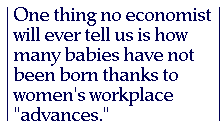 that year, full-time working women's wages were
57 percent those of men; by 2005,
they were "earning" (in a
manner of speaking) 77 percent as
much as men. [15] The men, of course, need that money to start or
maintain families; the women do not. Antifeminist
women once warned that if their husbands' family-wage jobs were engrossed by spinsters the money
would get wasted on clothing, cosmetics,
entertainment, travel, and other frivolities. I do
not have hard data on that, but certainly
consumer-savings rates in general are extremely
low today: it would be worthwhile to disaggregate
the figures by sex. One thing no economist will
ever tell us, however, is how many babies have not
been born thanks to women's workplace
"advances."
that year, full-time working women's wages were
57 percent those of men; by 2005,
they were "earning" (in a
manner of speaking) 77 percent as
much as men. [15] The men, of course, need that money to start or
maintain families; the women do not. Antifeminist
women once warned that if their husbands' family-wage jobs were engrossed by spinsters the money
would get wasted on clothing, cosmetics,
entertainment, travel, and other frivolities. I do
not have hard data on that, but certainly
consumer-savings rates in general are extremely
low today: it would be worthwhile to disaggregate
the figures by sex. One thing no economist will
ever tell us, however, is how many babies have not
been born thanks to women's workplace
"advances."
Another consideration that must temper our
enthusiasm for these "advances" is the tax
increases we have, not coincidentally, suffered
during the same period. Shrewd observers have
long understood the natural alliance between
feminists wanting to nudge or compel women into
the workplace and rapacious government wanting
to tax their earnings. It is another instance of the
common symbiosis between self-indulgence
and despotism, the divide-and-rule principle
applied to the family.
 Finally, one of the great suppressed realities of the
contemporary workplace is the widespread
existence of mother guilt in female employees:
pangs of conscience brought on by leaving their
children to the care of paid surrogates out of a
misguided belief that they are "supposed to" keep
up with men by holding down full-time jobs. This
probably contributes to the notorious personal
unpleasantness of many working women, and it
certainly affects their job performance.
Finally, one of the great suppressed realities of the
contemporary workplace is the widespread
existence of mother guilt in female employees:
pangs of conscience brought on by leaving their
children to the care of paid surrogates out of a
misguided belief that they are "supposed to" keep
up with men by holding down full-time jobs. This
probably contributes to the notorious personal
unpleasantness of many working women, and it
certainly affects their job performance.
Apparently it is not as easy to find examples of
stay-at-home mothers torn up at the thought of
multinational conglomerates deprived of their love
and comforting.
October 13, 2008
To the conclusion of the series
(sections 11 and 12).
Back to sections 7 and
8.
© 2008 F. Roger Devlin. This page © 2008 WTM
Enterprises. All rights reserved.
If you found this article to be interesting, please donate to our cause. You
should make your check or m.o. payable in U.S. dollars to WTM Enterprises and send it to:
WTM Enterprises
P.O. Box 224
Roanoke, IN 46783
Thanks for helping to assure a future for TLD!
Notice to visitors who came straight to
this document from off site: You are deep in The Last Ditch. You should check
out our home page and table of
contents.
 People join together not simply to be together but to do things they cannot
do alone. Traditionally,
they have formed families to carry out the essential function of childrearing
— along with various economic tasks subordinate to that end, and some
secondary functions such as care of the elderly. Conversely, to remain strong,
the family must retain some of those functions. Today, however, a father's
upper-body strength is no longer needed to provide for children; his personal
courage is seldom called upon to protect them. A mother can get clothing and
even prepared food from stores more easily than produce those things at home. In
other words, the domestic economy has been "outsourced."
People join together not simply to be together but to do things they cannot
do alone. Traditionally,
they have formed families to carry out the essential function of childrearing
— along with various economic tasks subordinate to that end, and some
secondary functions such as care of the elderly. Conversely, to remain strong,
the family must retain some of those functions. Today, however, a father's
upper-body strength is no longer needed to provide for children; his personal
courage is seldom called upon to protect them. A mother can get clothing and
even prepared food from stores more easily than produce those things at home. In
other words, the domestic economy has been "outsourced." von Mises may not quite have been the Wild West, it did allow
significant scope for such male traits as competitiveness, risk-taking,
leadership, enterprise, and initiative. In a postindustrial
bureaucratic corporation there is little room for any of these. The same
psychological traits that once made women better at knitting than men, viz.,
a high degree of tolerance for routine and repetition, today give them an edge
in common forms of employment such as word processing and data entry.
von Mises may not quite have been the Wild West, it did allow
significant scope for such male traits as competitiveness, risk-taking,
leadership, enterprise, and initiative. In a postindustrial
bureaucratic corporation there is little room for any of these. The same
psychological traits that once made women better at knitting than men, viz.,
a high degree of tolerance for routine and repetition, today give them an edge
in common forms of employment such as word processing and data entry.
 The contemporary white-collar employee is dependent upon a boss for his
livelihood, and must therefore be deferential, diplomatic, and often less than
forthright about what he thinks. It is not hard to see which sex is better at
this sort of behavior. Women are cunning and play their cards close to
their chest: an evolutionary adaptation left over from the days when their
survival and reproductive success depended on an ability to manipulate males
physically stronger than themselves. Today, it makes them naturals at office
politics.
The contemporary white-collar employee is dependent upon a boss for his
livelihood, and must therefore be deferential, diplomatic, and often less than
forthright about what he thinks. It is not hard to see which sex is better at
this sort of behavior. Women are cunning and play their cards close to
their chest: an evolutionary adaptation left over from the days when their
survival and reproductive success depended on an ability to manipulate males
physically stronger than themselves. Today, it makes them naturals at office
politics. The practical result of loudly proclaiming that
careers will be opened to talents, as
students of the "civil rights" movement know, is
that vast hordes of formerly contented
mediocrities start thinking of themselves as
talented. When they fail at their endeavors, they
feel cheated, assume someone else must be to
blame, and call for punishment.
The practical result of loudly proclaiming that
careers will be opened to talents, as
students of the "civil rights" movement know, is
that vast hordes of formerly contented
mediocrities start thinking of themselves as
talented. When they fail at their endeavors, they
feel cheated, assume someone else must be to
blame, and call for punishment. that year, full-time working women's wages were
that year, full-time working women's wages were
